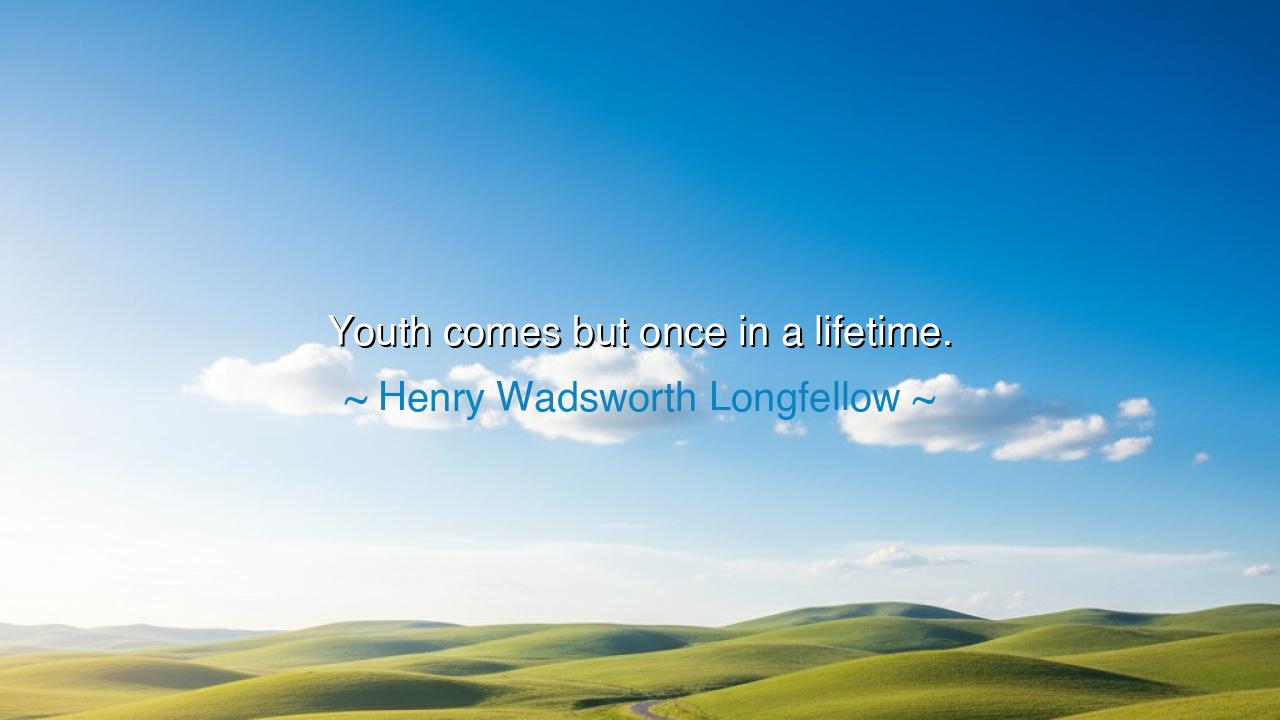
Youth comes but once in a lifetime.






Henry Wadsworth Longfellow, the poet whose verses often carried the cadence of eternity, declared with simple gravity: “Youth comes but once in a lifetime.” These words are both a reminder and a warning. They tell us that youth, with its fire, its daring, its beauty, and its hunger, is a fleeting guest. It arrives with great energy, then departs silently, leaving only memories in its place. To squander it is to lose something that cannot be called back again, for no man can summon spring once winter has settled.
The origin of this truth flows from Longfellow’s vision as a poet of the nineteenth century. He lived in an age when life’s seasons were more visibly marked — childhood labor, early marriages, and brief spans of vitality. He saw clearly that youth, unlike wealth or honor, could not be regained once it was spent. This was not mere sentiment, but the wisdom of observation: the young rush forward, believing their strength eternal, but the poet’s voice whispers across the years, reminding them that time is swift, and the vigor of youth is the rarest of treasures.
Think of Alexander the Great, who, before the age of thirty, had conquered lands stretching from Greece to India. He seized his youth like a burning torch and carried it through history. His days were few, for death came early, but because he did not waste the force of his youth, his name is still spoken with awe centuries later. Compare him to those who, having been given the same measure of years, let them slip into idleness. Their names are forgotten, buried in the silence of time. This contrast shows us that while youth is fleeting, what one does with it echoes long after it has passed.
Youth is not simply an age of the body — it is the season of courage. It is the time when one may dare to dream, to set sail into uncharted waters, to rise and fall without the weight of too many chains. But once the season shifts, responsibilities grow heavier, strength wanes, and the fire of daring burns lower. Longfellow’s words are not meant to sadden, but to awaken: to say, “Do not wait until your hands are weary and your heart cautious. Act now, while you still have the force of youth.”
To the young who hear this teaching: know that your days of vigor are numbered. Do not waste them only in comfort or idle distraction. Instead, learn, strive, explore, and give of yourself while your strength is still fresh. If you have a dream, pursue it now. If you wish to master a craft, begin at once. Do not let fear or sloth rob you of the only youth you will ever have. It is not meant for endless indulgence, but for the building of a foundation that will carry you into the later seasons of life.
To the elders, these words carry a different message: do not grieve that youth has passed, for it comes to all. Instead, let your memory of that season be a guide for the young. Share your lessons, encourage their daring, remind them gently of the brevity of the flame, so that they may use it wisely. Though youth does not return, wisdom ripens with age, and this too is a gift that must be passed down.
The lesson is clear: time is sacred, and youth the swiftest of its rivers. Let no one stand idle upon its banks, watching it flow away. Leap into its waters, swim with strength, and let it carry you toward the destiny you were born to fulfill. For once gone, it will not return, and the songs left unsung will haunt the silence of old age. But if seized, if used with courage and purpose, youth will be remembered not as a vanished season, but as the dawn of a life well lived.
Thus Longfellow speaks across centuries, calling us to awake. Youth comes but once in a lifetime — treasure it, honor it, and live it with such fullness that when it passes, you will greet the next season not with regret, but with gratitude, knowing you did not let the flame burn in vain.






AAdministratorAdministrator
Welcome, honored guests. Please leave a comment, we will respond soon